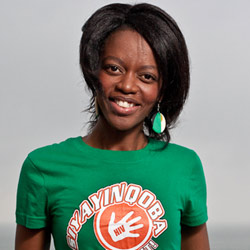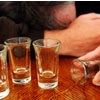“The power that man had over me was great, he adored me, yet when I fell pregnant he disappeared off the face of the earth.” 23-year-old Nokubonga Yawa’s words ring true to thousands of South African women, who’ve been deserted just when they can least afford to be left.
Today, Yawa, the Siyayinqoba Beat It! TV show host, Equal Education youth group leader & TAC volunteer peer educator has a fast-growing audience drawing positive inspiration from her story.
Yawa was born in Khayelitsha and grew up cared for by a single mother. With no firm role model, she grew accustomed to different father figures walking in and out the door. And all the questions a girl needs a father's answers to, she had to find herself, through trial and blunder.
“I saw what my mother was going through, I saw her hardships and I wanted to help her. A lady from our church looked after me and paid for my education because my mother couldn’t afford to send me and my siblings to school. There were times I had to go through the dirt bin for food, and other people’s waste then became our meal,” recalls Yawa.
My knight in shining armour
He arrived when she most needed a saviour, he who was the older man who became her ‘sugar daddy’. “He had everything I needed, everything I wanted. He provided me with food and money, and finally I could provide for my family’s needs,” she says.
At the age of 15, however, Yawa became pregnant. Confused about whether to be excited or not, she broke the news to the soon-to-be father, and he fled back to the Eastern Cape. Gone for good, he left her behind with two life changing keeps. Five months into her pregnancy, she decided to take an HIV test, out of curiosity. She discovered that she was HIV positive. She was immediately referred to a prevention of mother to child transmission support group by the clinic. At that point in her life pen and paper became her best friends, the only friends that weren’t passing snide comments at her.
“At that time in my life I thought that there was no other option other than sleeping with that man. I was not informed and I had no one to seek advice from. My mother never had those important talks about sex with me, that I plan to have with my daughter,” says Yawa.
Coming out of the closet
Yawa says news of her status spread fast. “Other HIV positive mothers knew the signs of my status. They saw me go to the clinic, coming from the clinic, and the treatment my baby and I were getting, and they put two and two together”.
The gossiping became so bad that one Sunday afternoon she decided to ‘out’ herself to those very people spreading the rumours. “I climbed on top of a dirt bin on the street corner, stood there with tears in my eyes and declared my status. I screamed: stop gossiping about me. I am HIV positive and I have done something about it. What are you doing about yours other than gossiping about mine? I had to put an end to the rumours and judgemental stares. Coming clean was a relief.”
How a teenage mother became an inspiration
After embracing her status, her passion shifted toward allowing teenagers who find themselves in similar situations to learn from her mistakes. She says: “I wanted people to realise that there is a life after HIV/Aids.”
With this at heart, Yawa decided to join a support group and learn more about HIV/AIDS. She wanted to empower herself and help others also dealing with their diagnosis. She was determined to break the stigma around HIV and especially how people contracted HIV. “People in my township were more fixated on the manner in which I contracted HIV instead of my status on its own,” she says.
In 2007 Community Media Trust approached her to feature in a Siyayinqoba Beat It! show on teenage pregnancy. She was asked to become the host for Siyayinqoba Beat It! in 2009. Some of the topics Siyayinqoba Beat It! tackles generate strong reactions from audiences: “I’ve had to deal with a strong reaction from men who were angry at me for having talked about circumcision, but I feel that talking about it contributes to reducing the risk of infections,” she says.
Parents have to talk about sex
Yawa: “I wish we had open parents. I wish children found friends in their parents, in order to open up to these issues that need to be talked about." She believes that culture and religion have a major inhibitive role. They don’t know how to talk to their children about sex, because their parents couldn't talk to them about it.
“I cannot blame anyone for what happened to me and I don’t regret anything, but if my mother had sat me down, I wouldn’t be what I am today,” she explains.
Parents know about these issues but choose to ignore them. So my question stands, she says - when will the cycle of HIV and ignorance die down? Social issues such as these should be addressed at home, where everything should start.
(Zaakirah Rossier, Health24, November 2010)
Read more:
Women’s vulnerability to HIV
The burden of HIV/Aids on women
Night out with Bra Mo
“Brokeback marriage”




 Publications
Publications
 Partners
Partners















